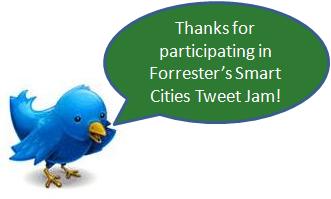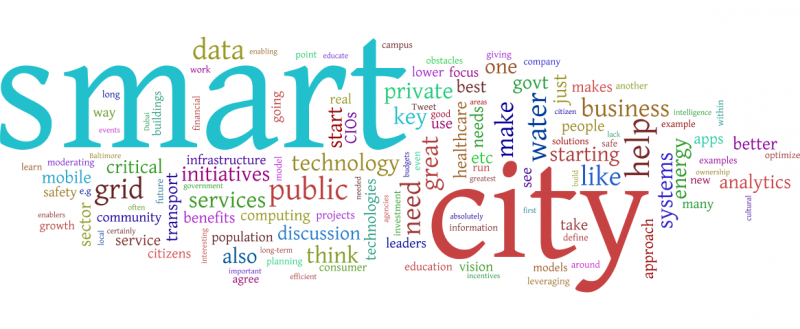“Smart” Is Here To Stay: Smart City Tweet Jam Summary
 Forrester’s Smart City Tweet Jam was a great success. On Tuesday morning/afternoon/evening, smart city followers around the globe participated in an hour of intense tweeting on smart cities. We touched on a range of issues from the definitions of a “city” and a “smart city” and the evolution toward the goal of becoming smart to the challenges city leaders face and the business models that enable adoption of technology-based solutions. We ended with a contrarian view that “smart cities” might just be a fade. But that was quickly refuted with reminders of the growing challenges faced by cities and the imperative of facing these challenges in a sustainable manner.
Forrester’s Smart City Tweet Jam was a great success. On Tuesday morning/afternoon/evening, smart city followers around the globe participated in an hour of intense tweeting on smart cities. We touched on a range of issues from the definitions of a “city” and a “smart city” and the evolution toward the goal of becoming smart to the challenges city leaders face and the business models that enable adoption of technology-based solutions. We ended with a contrarian view that “smart cities” might just be a fade. But that was quickly refuted with reminders of the growing challenges faced by cities and the imperative of facing these challenges in a sustainable manner.
 One hour, 62 Twitterers, and 389 tweets later we were exhausted – at least I was. But we were pleased to have aired and shared our opinions about the challenges, the potential solutions to those challenges, and the paths and business models that will make those solutions possible in the short-run, and hopefully sustainable in the longer term. Below are some excerpts from the conversation. But there were many interesting points of view and contributions to the discussion. I've included here a visual representation of the key words and topics discussed during the Tweet Jam, created using ManyEyes. For the more stats and the full transcript, check out #smartcityjam.
One hour, 62 Twitterers, and 389 tweets later we were exhausted – at least I was. But we were pleased to have aired and shared our opinions about the challenges, the potential solutions to those challenges, and the paths and business models that will make those solutions possible in the short-run, and hopefully sustainable in the longer term. Below are some excerpts from the conversation. But there were many interesting points of view and contributions to the discussion. I've included here a visual representation of the key words and topics discussed during the Tweet Jam, created using ManyEyes. For the more stats and the full transcript, check out #smartcityjam.
Here are some of the questions and response excerpts from the Smart City Tweet Jam, #smartcityjam:
What is a “city”?
- @parapadakis "city" is also the community: arts, theatre, friends hanging out, local events, etc
- @eric_andersen @jenbelissent how about any population center which has centralized local govt that can define and implement strategic goals
- @citizenIBM Cities are really a collection of systems, all revolving around citizens.
And, of course, what is a smart city? Or more precisely, how best does a city get smarter?
- @IBM_ECM_GOV Regardless of function a smart city needs to be connected with people, policy and process to placed in context of area
- @jenbelissent Awareness (data capture), Analytics (BI), Alternatives (work flow/rules), Actions (processes), Audit – 5As of Smart.
- @parapadakis smart cities should respond dynamically to change. City people are often "sensors", if we can harness the information
- @usmansindhu smart city has to be a connected ecosystem from consumer to the critical service providers and critical infrastructure
- @jenbelissent What better way to get smarter than make a population smarter. Don't forget Education
- @parapadakis Y-gen seem more conscious of long-term impact. They will be the "smart" advocates. Need to educate them!
- @hhaswell Smarter cities take health seriously. They have lower instances of chronic diseases, lower obesity and a healthier workforce.
- @heidishey @parapadakis @eric_andersen Thinking that mobile apps is another way to reach/access Gen Y to educate/involve
Can a city evolve from one initiative like “smart grid” to a broader smart agenda? How?
- @dougwashburn @jenbelissent Yes, starting with a single issue is the best approach since the scope of the #smartcity is so vast.
- @citizenIBM creating a truly city-wide strategy is the most important first step in making any city smarter
- @wfavero @asabiliaAR I think size has to be a critical element of implementation. Sometimes starting small makes tracking simpler
- @horizonwatching @jenbelissent most important component will be properly trained people who can take advantage of the technology.
- @rkpaleru Financially analyze & optimize- operational decisions…eg. Cut costs of value to fewer citizens (not across board cost cuts)
- @florence1980 @jenbelissent @dougwashburn A city can start where the need is greatest -grid, water, buildings, safety- starting is the key
What are the major obstacles or challenges to implementing technology within a city?
- @jenbelissent Multiple stakeholders, politics, budgets and inertia are obstacles to smart cities.
- @mauricioswg RT @jenbelissent: Any other obstacles you see to smart cities? << Public opinion, budget/cost, capabilities and skills
- @IBM_ECM_GOV @jenbelissent Budget and culture just look at the resistance Stockholm had for smarter transport system but it succeeded
- @eric_andersen @jenbelissent the current economy – often makes it challenging to focus on long-term initiatives and growth
- @lindahunt123 RT @parapadakis: @dougwashburn computing technologies are certainly enablers, but there needs to be a cultural shift to "smart"
- @eric_andersen @jenbelissent another obstacle is finding good talent and the right the skills to work on smarter city initiatives
- @dougwashburn… but even this is a challenge: which one or two #smartcity areas shoud CIOs focus on? Utiltiies, education, healthcare, etc
What are the new business models that enable technology adoption in the public sector in general, smart cities specifically?
- @jenbelissent New business models stretch budgets – leverage external funds, public private partnerships and revenue generating initiatives.
- @citizenIBM Innovation from the private sector can help make systems that run a city’s services smarter, more efficient, more effective
- @horizonwatching Fed Gov should help fund 3-4 pilot cities across US to pilot smart city vision. Experiment, fail/succeed, then replicate
- @parapadakis Curious: How much can smart cities self-fund, through reduced red-tape and reduced headcount thru operational efficiencies?
- @jenbelissent Thoughts on data monetization as a business model? Sell data captured to developers through a “data store”? Feasible?
Who will take the ownership of the financial sustainability of the smart cities?
- @dougwashburn In terms of who will take ownership, it's going to be public and private investment… with emphasis on private
- @marykeeling There is a huge opportunity for public sector to leverage smart technology to deliver better quality services
- @repsychler Smart city must be managed like a smart business
Devil’s advocate: Is “smart” a fad? Will the “smart city” wave quickly fade? What will remain?
- @parapadakis It's not possible to go back. no-brainer…
- @mauricioswg Smart is not a fad. It's the future.
- @donpd We can call it Smart, we can call it "better govt" the key is to have govt do things better
- @eric_andersen "Smart city" initiatives will always be needed as long as population growth continues (especially in cities)
- @jenbelissent The word “smart” may fade but use of technology to improve city systems and address urban challenges will persist, and grow
We are eager to continue the conversation. Please feel free to reach out to Forrester through @jenbelissent, @dougwashburn, and @usmansundhu
Thanks again for participating!